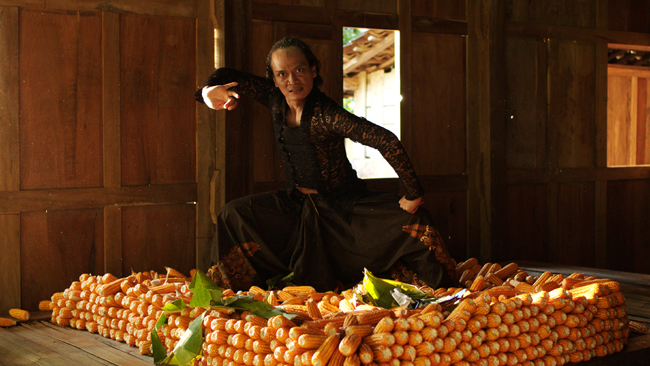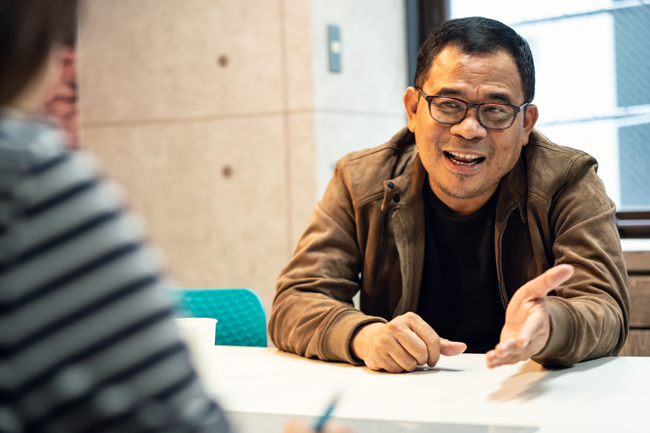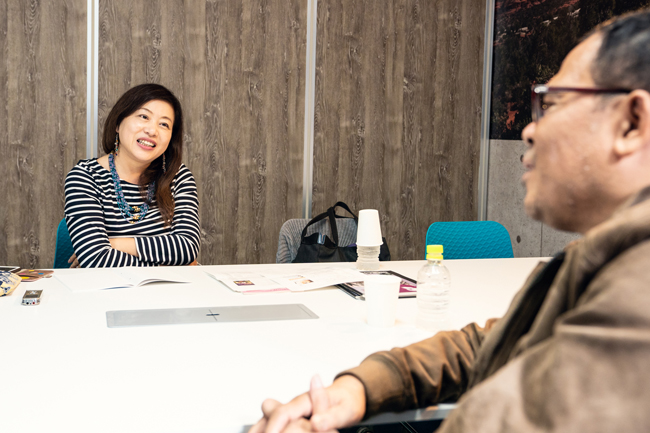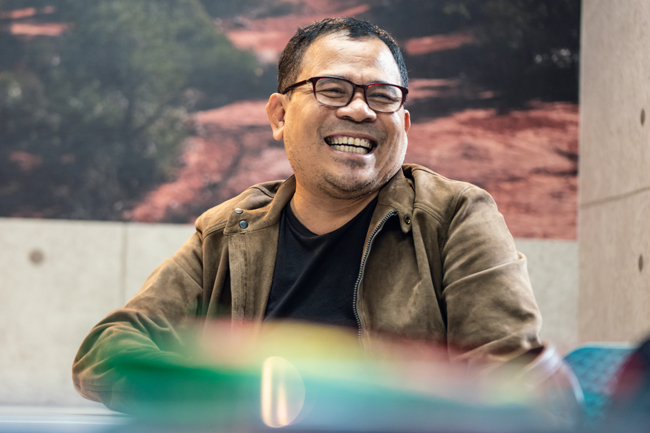About the latest Film, Memories of My Body (2018)

Yui: What kind of film is your new work, Memories of My Body (2018)?
Garin: It's the story about male dancers of Lengger*14 and Reog*15 . Some male dancers in the Reog performance are called Gemblak. He becomes a good dancer only after he gets a male partner. Lengger is a dance in which men dress as women and perform the female roles. Look at wayang from India, and you'll see that the heroes are all strong and brave. In Java, heroes are portrayed as gentle and fair, even Arjuna*16 . I think the refinement and elegance in Javanese men makes Javanese culture and spirituality distinctive. I focused on the LGBT traditions that are rooted in less well-known regions. There are actually a lot, but no one is putting them "in the frame", so to speak. People in the middle and upper classes mainly see LGBT films as a lifestyle, but LGBT exists within traditional Indonesian culture. Rather than taking on the topic of LGBT directly, this film shows masculinity and femininity combined within one body.
*14 Lengger: A traditional dance from the Banyumas region in central Java.
*15 Reog: A traditional dance from East Java; also known as the lion dance.
*16 A hero who appears in the epic Mahabharata, one of the Hindu scriptures.
Yui: Will it be released in Indonesia? It seems that censorship by society is becoming strict.
Garin: No, it will be released. Even anti-NII films like The Blindfold have been able to be publicly shown. While this film was in production, Densus 88*17 (a Special Forces counter-terrorism squad) came into my house. All the roads around the house were blocked, and the captain of Densus 88 brought some unbelievable weaponry. It seems that because I was in contact with former members of NII for research for the film, I had been suspected of a relationship with NII. I had been meeting with high-ranking former NII members and investigating how they searched for hideouts or how they communicated. I guess the Special Forces must've been perplexed as to why they were going to arrest a film director. (laughs)
During Bird Man Tale, too, I was shooting with hundreds of Free Papua Movement flags, so I was questioned by the police and national military. Even in Jakarta, I was summoned to the military headquarters. This much is normal. It's a risk you take. But I don't mind. In reality there are a lot of difficulties that come up during the production of a film, but you don't have to talk about them publicly or your problems will be even bigger.
*17 Densus 88 (abbreviated from Detasemen Khusus 88, or Special Detachment 88)
An Indonesian Police Force Special Forces counter-terrorism squad, formed in 2003 after the 2002 Bali bombings. It carries out search-and-destroy operations of Islamic extremists.
The Next Generation of Filmmakers
Yui: Please tell us about the next generation in film, such as your daughter Kamila Andini or Mouly Surya.
Garin: Everyone, they're more wonderful than I am. At the 18th Tokyo FILMeX Awards in 2017, those two female directors accomplished the spectacular feat of a double win—they both won the Grand Prize*18 . They are shooting much better films than their male counterparts. For two young female directors to be internationally active at the same time is a first in Indonesian film history. Is it not rare worldwide as well? Definitely I'll support them. As for male directors, it's more varied. I teach at a university, and have been doing a workshop at SET Film*19 as well. Riri Riza and Hanung Bramantyo were my students who had great success as film directors after working at SET. The Jogja-NETPAC Asian Film Festival (JAFF), which I launched, has been managed by Yosep Anggi Noen, Ifa Isfansyah, and Ismail Basbeth. All of them have become well-known film directors.
*18 Kamila Andini's The Seen and Unseen and Mouly Surya's Marlina the Murderer in Four Acts both won the Grand Prize; the latter was originally written by Garin Nugroho.
*19 Garin Nugroho's film production company.

Other Projects
Yui: How many years has JAFF (Jogja-NETPAC Asian Film Festival) been happening?
Garin: This is its 13th year. I'm not heading it anymore; I'm leaving it up to the younger generation. I'm more active in Solo (Surakarta). I'm preparing a master's course at Institut Seni Indonesia Surakarta (Indonesia institute of the Arts Surakarta). Besides that, I'm also involved in the Madani Film Festival as a committee member. It's a film festival, aimed at Islamic countries, that's very open and excludes radicalism. Indonesia is the world's largest Islamic country. Though there are instances of talking about Islamic doctrine, the real lives of Muslims living in a variety of places haven't been seen much in film. This festival's theme is the diversity of the Islamic world. I am also involved with a training program for performing artists called Ruang Kreatif. The program looks for performance arts projects in a variety of fields within the country, and provides aid to groups that have made excellent proposals. Workshops are conducted for selected groups, who ultimately will be given an opportunity to perform their work for a general audience.
Yui: You yourself produce not only films, but artwork as well. You must be very busy.
Garin: I've exhibited work twice at ArtJog*20 . It's like a religious ceremony in a village in Bali—the villagers do everything. Decorating, cooking, dancing, praying...it's like performing all of those traditional rituals. If I'm given the duties of festival leader for today, I will do them; if I'm told to cook, I will do it. Religious ceremonies are very simple, because we're dedicating ourselves to our God and creator. My management style is based on shifting cultivation. It's the same method Kalimantan farmers use, like planting seedlings as you travel around. I plant seedlings in various places, and care for them as they grow. It's difficult to do, since my seedlings are growing in different places like Jakarta, Yogyakarta, Solo, and Singapore. It's not a modern management system; it's quite primitive. But modern management doesn't work well. It's not good to think too hard. Modern people think too much about everything.
*20 An international art festival held annually in Yogyakarta.

Yui: Any upcoming projects?
Garin: There will be a choral performance by a choir from Nusa Tenggara*21 ; the theme is "the planet". The song is a lamentation of sacrifice, with the road on which Jesus carried the cross as a motif. Humans create artifacts, and nature is threatened by them. Cities are covered in asphalt roads and buildings. Nature is searching for a place to live, as are the wind, rain, and waves, though it was originally a part of them.
*21 A group of islands east of Bali, from Lombok Island to the western part of Timor Island.
Yui: So the theme is something like "return to nature"? Is film not involved?
Garin: I may play a film in the background of the chorus. Other than that, I have a few plans for films. I'd like to use Japanese actors; do you know any good ones? I think I'd like to make a film about the general election. I'm also considering the expansion of Setan Jawa; I'd like to hold dance dramas or exhibitions.
You hear "Java" even in the computing world. But Java has a long history, and much of the world's oldest remaining archaeological legacies. In agricultural products you also have Java coffee—from technology to literature and even plants, Java itself has become a source of inspiration. I focus on Java, but of course I'd like to explore other regions as well.
Yui: Thank you so much for joining us today for this long interview!

[On October 27, 2018 at Onarimon]
More information
Chaotic Love Poems
Opera Jawa
Setan Jawa
Memories of My Body
Filmography
1984: Gerbong Satu, Dua (Wagon 1, 2)
1989: Tepuk Tangan
1991: Cinta Dalam Sepotong Roti (Love in a Slice of Bread)
1991: Air dan Romi (Water and Romi)
1994: Surat untuk Bidadari (Letter to an Angel)
1995: Dongeng Kancil untuk Kemerdekaan (Kancil's Tale of Freedom)
1995: Bulan Tertusuk Ilalang (...and the Moon Dances)
1998: My Family, My Films and My Nation
1998: Daun di Atas Bantal (Leaf on a Pillow)
2000: Puisi Tak Terkuburkan (A Poet)
2001: Layar hidup: Tanjung priok/Jakarta (Waterfront)
2002: Rembulan di Ujung Dahan (TV)
2002: Aku Ingin Menciummu Sekali Saja (Bird Man Tale)
2004: Rindu Kami Padamu (Of Love and Eggs)
2006: Serambi
2006: Opera Jawa (Requiem from Java)
2008: Di Bawah Pohon (Under the Tree), Teak Leaves and The Temple
2009: Generasi Biru (The Blue Generation)
2012: Mata Tertutup, Soegija
2013: Isyarat
2014: Guru Bangsa: Tjokroaminoto
2015: Aach... Aku Jatuh Cinta! (Chaotic Love Poems)
2016: Nyai (A Woman from Java, Setan Jawa (Satan Jawa)
2018: Kucumbu Tumbuh Indahku (Memories of My Body)
Interview and text: Rieko Yui
Indonesian interpreter / translator. attended BIPA Indonesian language course at University of Indonesia in 1994. After returning to Japan, as an interpreter, has engaged in some collaborative art projects between Japan and Indonesia since 1996. In 2008-12, 2015-18, worked as a coordinator at Arts and Culture section, the Japan Foundation Jakarta. Currently besides translation works, in charge of editing bulletin at the Japan Indonesia Association, Tokyo.
Photo: Motoi Sato






